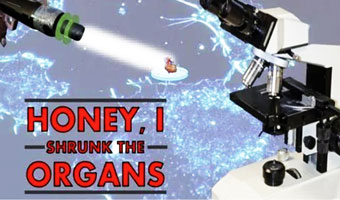
Researchers in the Hadassah Medical Organization’s Division of Cardiology, after studying a large group of people from Israel and France, have identified 28 families with a genetic abnormality that is a genetic pathway to the most common congenital heart malformation: a bicuspid aortic valve.
While normal aortic valves have three leaflets, bicuspid valves have only two, leading to significant cardiac complications that often require surgery to repair.
It was through examining the 70 affected individuals’ genetic information that the research team was able to pinpoint the route to developmental abnormalities. Dr. Idit Gabai, who worked on this project for her senior medical thesis together with Hadassah Heart Institute physicians Dr. Ronen Durst and Prof. Dan Gilon, pioneered new approaches in genetic data analysis in this multi-step complex genetic study.
They began with exome genetic sequencing, which determines the primary structure of the protein-coding region of genes. This process enabled them to isolate the relevant portions of DNA. They then looked for the mutations that were consistent in all the families. Next, they employed a unique strategy in genetic analysis to exclude all common mutations, keeping only rare variants with a frequency of less than one in a thousand in the general population.
Narrowing the analysis further, they identified those rare variants that are predicted to adversely affect the function of the protein generated by that gene. Then they cross-referenced these genes with genes that are known to be involved in cardiac development.
The result: there were seven “finalists.” The most promising of these proved to be one called MINDBOMB1 (MIB1). This gene is involved in a pathway that is highly active during cardiovascular development.
Together with their colleagues in Spain, the Hadassah researchers assessed models of this mutation in zebra fish. When they injected a mutant mRNA based on this mutation into zebrafish embryos, it led to maldevelopment of the heart!
Next they assessed the impact of this mutation in mice who already had some loss of function in the cardiac developmental pathway. These mice developed bicuspid aortic valves, as well as other cardiac abnormalities.
They also created an MIB1 ”knockout mouse” model, where the mice no longer had a functioning MIB1 gene. All of the mice exhibited developmental cardiac mutations, including bicuspid aortic valve, quadricuspid aortic valve (with four leaflets), and ventricular septal defects (a hole in the wall that separates the right and left ventricles of the heart).
The research team plans to continue their studies of this gene, as well as to explore the other six finalists they identified.
These findings, Hadassah’s Heart Institute reports, “may ultimately lead to gene therapies that mitigate the progression of disease.”
Learn more about the Hadassah Medical Organization.









